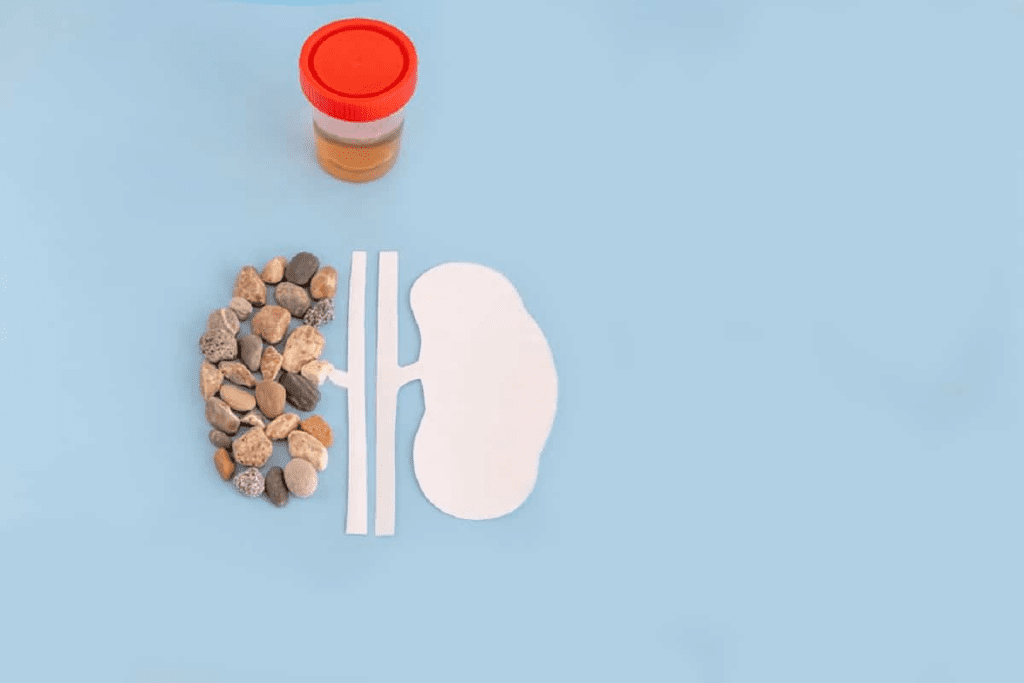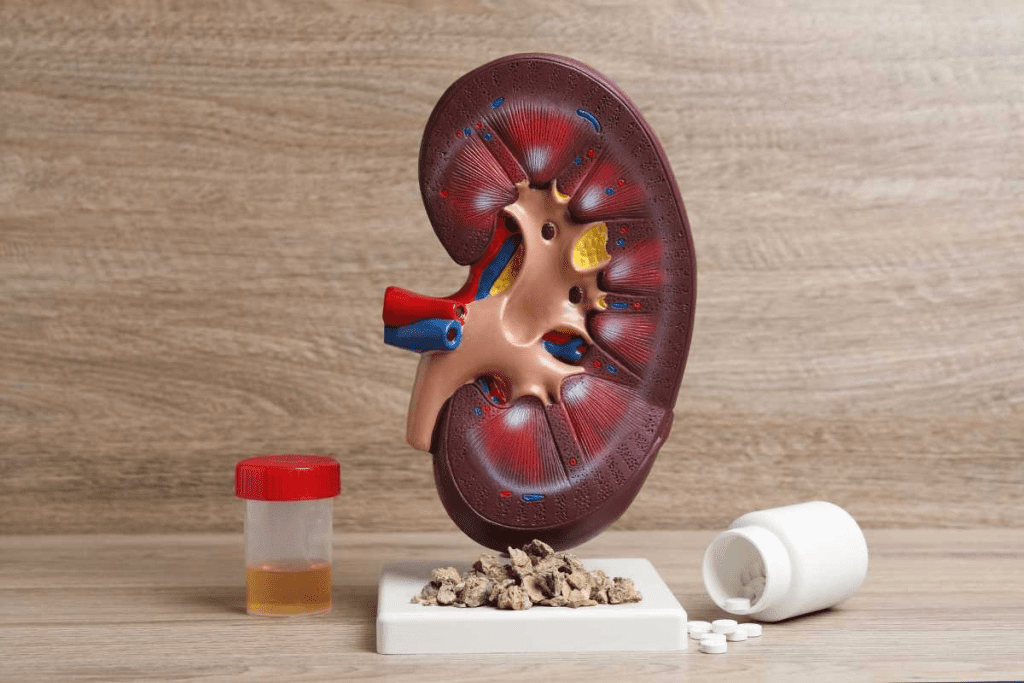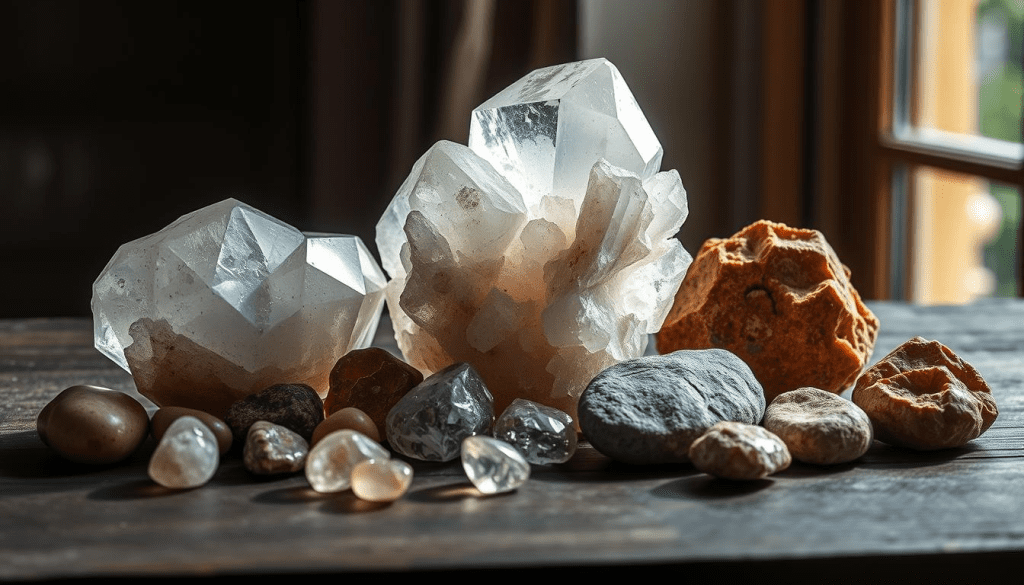Last Updated on November 25, 2025 by
We often hear about kidney stones, but what exactly are they? Renal calculi, or kidney stones, are hard objects made of minerals and salts. They form inside the kidneys.

These formations happen when minerals and salts in urine crystallize. This can be due to dehydration, a diet high in sodium or animal protein, obesity, and certain medical conditions. Knowing why nephrolithiasis disease happens is key to preventing it and getting the right care.
Kidney stones, also known as renal calculi, are hard deposits made of minerals and salts. They form inside the kidneys. These stones can cause severe pain, nausea, and vomiting, making them a big health concern.
Kidney stones are hard mineral deposits. They form when there’s an imbalance in substances like calcium, oxalate, and uric acid in the urine. This imbalance leads to small crystals that grow into stones.
The number of kidney stones in the United States has gone up. Data shows the overall prevalence of kidney stones in U.S. adults rose from 9.4% (2007-2008) to 10.2% (2017-2020). This increase is most notable among those who are obese.
Some key statistics include:
Kidney stones form when the urine can’t dilute certain substances. This imbalance leads to stone formation through several processes.
The crystallization process is key in forming kidney stones. It happens when urine gets too concentrated, allowing minerals to form crystals. Dehydration increases this risk, as it lowers urine volume. This makes it easier for crystals to form and stick together.

Minerals like calcium and oxalate build up in the urine. When their concentration gets too high, they form crystals. These crystals then clump together to create stones.
As stones grow, they can cause severe pain, often if they block the urinary tract. This pain is often accompanied by nausea, vomiting, and needing to urinate often. Knowing how stones form helps in preventing them and managing symptoms.
By understanding what causes kidney stones, people can take steps to lower their risk. This includes staying hydrated, adjusting diet, and managing health conditions.
There are many types of kidney stones, each with its own causes and risk factors. Knowing these differences is key to preventing and treating them well.
Calcium oxalate stones are the most common, making up 35-70% of all kidney stones. They often come from eating too much oxalate and not enough calcium. Some gut issues can also lead to these stones.
Uric acid stones are less common, making up about 10% of kidney stones. They are more common in people with gout or who are overweight. Eating a lot of animal protein can also raise your risk.

Struvite stones are found in about 15% of kidney stones. They are often linked to urinary tract infections (UTIs). These stones can grow fast and get very big.
Cystine stones are rare and happen in people with a genetic disorder. This disorder makes cystine leak through the kidneys. They need special treatment because of their unique makeup.
It’s important to know the type of kidney stone you have. This helps tailor treatment and prevention plans.
Certain factors increase the chance of getting kidney stones. We’ll look at these to see who’s at risk and why.
Kidney stones hit men more than women. Men have a 1 in 8 chance, while women have a 1 in 16 chance over their lifetime. Obese women face up to twice the risk than normal-weight women. The risk grows with age, mainly between 30 and 60.
Family history is key in kidney stone risk. Those with a family history are more likely to get them. Genetic predisposition can change urine substance levels, like calcium and oxalate, which are in most stones. For more info, visit Kidney Fund.
Where you live and the environment also matter. People in hot, dry places face a higher risk. This is because dehydration makes urine minerals more concentrated, increasing stone risk.
Knowing these risk factors helps prevent and manage kidney stones. Being aware of age, gender, family history, and where you live can help lower your risk.
Our daily habits greatly affect our risk of getting kidney stones. These stones are often caused by dehydration, diet, and health. Knowing these factors can help prevent kidney stones.
Dehydration is a major cause of kidney stones. Not drinking enough water makes urine more concentrated, raising the risk of stones. Drinking at least eight glasses of water a day is key to preventing stones.
Eating too much sodium increases kidney stone risk. High sodium levels can lead to more calcium in urine, causing stones. Lowering sodium intake by eating less processed food helps.
Eating too much animal protein raises stone risk. Animal proteins have purines, which increase uric acid in urine. Moderating animal protein can lower this risk.
Being overweight or obese also raises stone risk. Excess weight changes how the body processes substances, increasing stone risk. Keeping a healthy weight through diet and exercise helps prevent stones.
Understanding and tackling these lifestyle factors can lower kidney stone risk. Making smart choices about diet, hydration, and health greatly improves kidney health.
Certain medical conditions can raise the risk of getting kidney stones. These conditions change the body’s chemistry, making stones more likely to form.
Diabetes and metabolic syndrome increase the risk of kidney stones. Insulin resistance in these conditions changes urine composition, leading to stone formation.
Inflammatory bowel disease (IBD), like Crohn’s and ulcerative colitis, raises kidney stone risk. Malabsorption and dehydration from diarrhea play a role.
Hyperparathyroidism, with overactive parathyroid glands, raises blood and urine calcium levels. This significantly increases the risk of calcium stones.
Recurring urinary tract infections (UTIs) raise the risk of certain kidney stones, like struvite stones. UTIs change the urinary tract environment, making stones more likely.
It’s key to understand these medical conditions and their link to kidney stones. Managing these conditions can lower the risk of kidney stones.
To prevent kidney stones, making dietary changes and staying hydrated are key. We’ll look at the best ways to lower your risk of getting stones.
Drinking enough water is vital to prevent kidney stones. Adequate hydration makes urine less concentrated, which lowers mineral levels that can cause stones. Aim for 8-12 cups of fluid daily, with water being the top choice. Herbal teas and diluted fruit juices also count towards your daily fluid needs.
Your diet is a big factor in preventing kidney stones. Reducing sodium intake can lower your risk, as high sodium levels increase calcium in urine. Also, eating less food high in oxalate, like spinach and beets, helps if you’re prone to calcium oxalate stones.
Keeping a healthy weight is also key. Obesity is a risk factor for stones. Losing weight through a balanced diet and exercise can help. A healthcare professional can offer advice on maintaining a healthy weight.
For those at high risk, medication can help prevent stones. Thiazide diuretics lower calcium in urine, while potassium citrate makes urine less acidic, preventing certain stones.
By following these tips, you can greatly reduce your risk of kidney stones. Always talk to a healthcare provider to find the best prevention plan for you.
Understanding kidney stones and their causes is key to prevention. We’ve looked at different types of stones and how lifestyle and health conditions play a role.
To control your kidney health, make smart lifestyle choices and manage health issues. This approach can lower your risk of getting kidney stones and keep your kidneys healthy.
We urge you to act now to protect your kidneys. Drinking plenty of water, eating right, and keeping a healthy weight can greatly reduce your risk of kidney stones.
Kidney stones are hard deposits made of minerals and salts. They form in the kidneys when there’s an imbalance in these substances in the urine. This imbalance can happen due to dehydration, high sodium or animal protein diets, obesity, and certain medical conditions.
The crystallization process happens when minerals and salts in the urine become too concentrated. This causes them to form crystals. Dehydration, a diet high in sodium or animal protein, and certain medical conditions can lead to this.
There are several types of kidney stones, including calcium oxalate, uric acid, struvite, and cystine stones. Each type has its own causes and risk factors, like diet, genetics, and medical conditions.
Some people are more likely to get kidney stones. This includes those with a family history, obesity, diabetes, and certain medical conditions like hyperparathyroidism and urinary tract infections.
To prevent kidney stones, stay hydrated, make dietary changes, manage your weight, and take medication if needed. Drinking enough water, eating a balanced diet, and keeping a healthy weight can help.
To lower your risk, reduce sodium intake, limit animal protein, and maintain a healthy weight. Staying hydrated and managing any medical conditions also helps.
Yes, conditions like diabetes, metabolic syndrome, inflammatory bowel disease, hyperparathyroidism, and recurrent urinary tract infections can raise your risk.
Symptoms include severe pain in the side or back, nausea, vomiting, and difficulty urinating. If you have these symptoms, seek medical help.
Treatment depends on the stone’s size, location, and symptoms. It may include pain management, hydration, or surgery in some cases.
Subscribe to our e-newsletter to stay informed about the latest innovations in the world of health and exclusive offers!